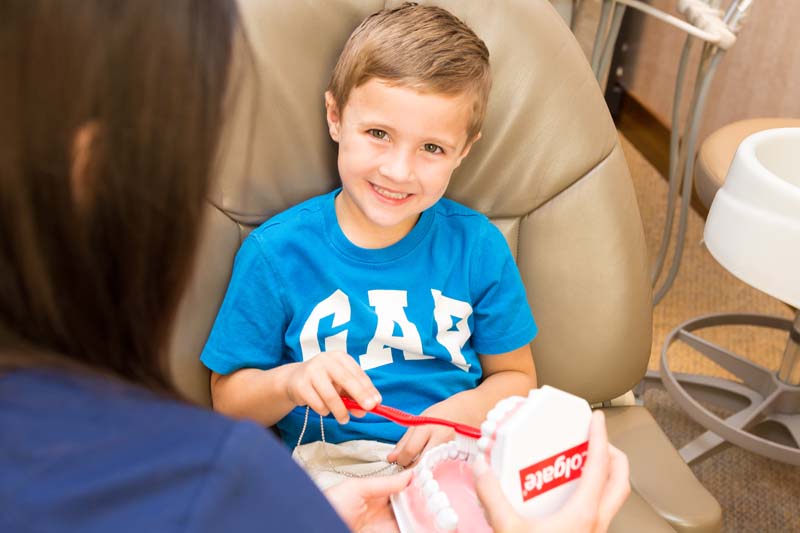Prevent Tooth Decay
Fluoride, in the proper dosage, has been shown to significantly reduce dental decay. When fluoridated water has less than the ideal amount or is not available, fluoride supplements are recommended. (A call to your local water district is all that is necessary to determine whether your water has fluoride or not.)
When supplements are needed, the administration of fluoride supplements should begin shortly after birth and continue through the time of eruption of the second permanent molars (approx. 12 years of age).
Regular dental check-ups at Kneib Dentistry should begin no later than 18 months of age.
Decayed Baby Teeth — Bottle Caries
Signs and appearance of baby teeth displaying bottle caries:
- Brown baby teeth with fragmented edges
- Upper front baby teeth that break easily
Children who have erupted teeth or are past the age to be weaned are highly susceptible to rotted front teeth when being put to bed with a bottle containing milk, juice, or other sugar-containing liquids. There is decreased salivary flow during sleep and clearance of the liquid from the teeth is slowed.
The liquid pools around the upper front baby teeth and creates an excellent environment to promote the growth of decay-causing bacteria. Removing the bottle before the first tooth appears and wiping the child's gums and teeth with a soft cloth before being put to bed can help prevent decay.
At 18 months of age, parents should bring their child into Kneib Dentistry for an examination by Dr. Kneib and recommended home care. We offer the latest technology in diagnosing bottle caries: the Diagnodent Caries Detection Aid. With this tool, even very small lesions are detected at the earliest stage.
Tooth Decay in Children — Cavities

Fluoride has been a great benefit to patients of all ages in helping prevent dental decay for children. Regular brushing and flossing lower the chance of developing "cavities."
At Kneib Dentistry, we know that the most decay-prone areas of teeth are the grooves and depressions on the chewing surfaces of the back teeth, which require further preventive care.
To prevent decay, a plastic-like coating called a sealant should be painted on the chewing surfaces of all the back teeth. Studies have shown that sealants can reduce tooth decay by as much as 90% to 100% in the Erie area and nationwide.
The American Dental Association recommends, and Dr. Kneib agrees, that sealants be placed as soon as the first adult back teeth come in at age 6 or 7. Sealants should continue to be used as each adult back tooth comes into the mouth. All back teeth that need to be sealed are present by age 13. Sealant application is simple and fast.
Family Dentistry FAQs
What is the Emergency Dental/Crisis Treatment?
Many people don't see a dentist on a regular basis. They go only when they feel they have a problem. At Kneib Dentistry, we call this "crisis treatment" as opposed to "preventive treatment."
While these patients may feel they are saving money, it usually ends up costing much more in both dollars and time. The reason for this is that most dental problems don't have any symptoms until they reach the advanced stages.
An example is tooth decay. At Kneib Dentistry, we hear all the time, "Nothing hurts... I don't have any problems." But tooth decay doesn't hurt! Until that is, it gets close to the nerve of the tooth.
Then a root canal and crown are usually necessary instead of the small filling, which could have been placed several years ago when the cavity was small. Dr. Kneib can usually detect a cavity 3 or 4 years before it may develop any symptoms. It is not uncommon to see a patient with a tremendous cavity and they have never felt a thing!
How can I spot dental problems?
When should my child first see a dentist?
How often should I get my teeth cleaned?
What happens at a dental check-up?

